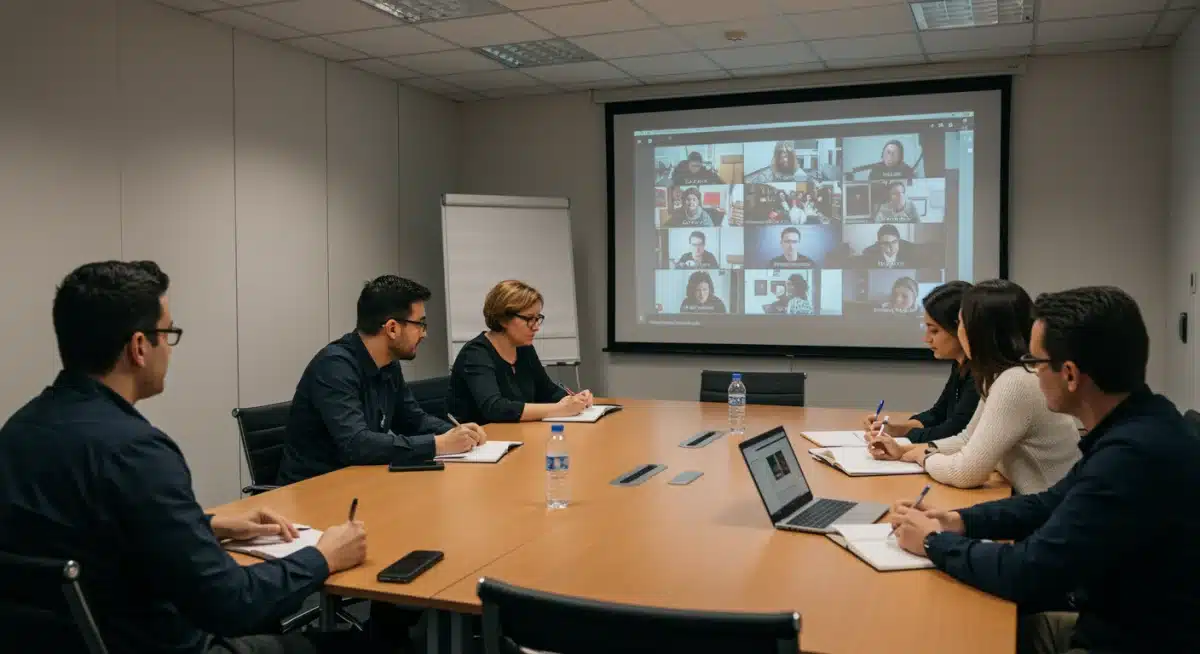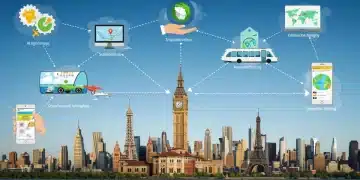U.S. Travel Labor Shortage 2025: 5 Recruitment Solutions

The U.S. travel sector faces a significant labor shortage in 2025; this article details five innovative recruitment solutions designed to attract and retain talent effectively.
The U.S. travel sector stands at a critical juncture in 2025, grappling with a persistent and evolving
travel labor shortage that threatens its recovery and growth. As demand for travel experiences surges, the industry struggles to find and keep the skilled workforce needed to deliver exceptional service. This article delves into five innovative recruitment solutions aimed at not only filling immediate vacancies but also fostering long-term talent retention.
Understanding the Root Causes of the Labor Shortage
Before implementing effective solutions, it’s crucial to understand the multifaceted reasons behind the current labor deficit in the U.S. travel sector. The pandemic exacerbated existing issues, leading to a mass exodus of experienced workers and a significant decline in new talent entering the industry. This section explores these underlying factors.
The pandemic introduced unprecedented instability, causing many hospitality and travel professionals to seek more stable employment in other sectors. This shift was driven by factors such as fluctuating job security, reduced benefits, and often, a lack of perceived career progression within the industry. The perception of the travel sector as unstable during times of crisis has left a lasting impact on potential recruits.
Shifting Workforce Demographics and Expectations
The modern workforce, particularly younger generations, places a higher premium on work-life balance, competitive compensation, and opportunities for professional development. The travel sector, historically known for demanding hours and entry-level wages, often falls short of these expectations.
- Competitive Wages: Many roles in travel and hospitality offer wages that struggle to compete with other industries, especially in a high-inflation environment.
- Work-Life Balance: Irregular schedules, including evenings, weekends, and holidays, deter candidates seeking more predictable routines.
- Career Advancement: A lack of clear pathways for growth can make the industry seem like a temporary stop rather than a long-term career.
Furthermore, the perception of physically demanding jobs, coupled with increased customer service pressures in a post-pandemic world, has made some roles less appealing. Addressing these fundamental challenges is the first step toward building a sustainable workforce.
In conclusion, the labor shortage is not merely a post-pandemic anomaly but a culmination of systemic issues, including economic instability, evolving worker expectations, and competitive pressures from other industries. A holistic understanding of these drivers is essential for crafting truly effective recruitment and retention strategies for the future.
Solution 1: Investing in Upskilling and Reskilling Programs
A proactive approach to combating the labor shortage involves significantly investing in upskilling and reskilling the existing workforce, as well as attracting new talent with robust training initiatives. This strategy not only enhances employee capabilities but also demonstrates a commitment to their professional growth, fostering loyalty and reducing turnover.
Many current employees possess foundational skills that can be adapted and expanded through targeted training programs. For instance, front-desk staff can be trained in advanced digital booking systems or even cross-trained for supervisory roles. Similarly, individuals from other service industries can be reskilled to meet the specific demands of the travel sector.
Implementing Comprehensive Training Initiatives
Effective upskilling and reskilling programs require careful planning and execution. They should be designed to address current skill gaps while also anticipating future industry needs, such as proficiency in AI-powered tools or sustainable tourism practices.
- Digital Literacy Training: Equipping employees with skills in reservation software, online customer support platforms, and data analytics.
- Leadership Development: Identifying high-potential employees and providing them with management training to fill supervisory roles internally.
- Cross-Training Opportunities: Allowing employees to gain experience in different departments, making them more versatile and valuable assets.

Moreover, partnering with educational institutions and vocational schools can create pipelines for new talent. These partnerships can offer internships, apprenticeships, and specialized courses that align directly with the industry’s needs, providing practical experience and a clear path to employment.
By investing in their workforce, travel companies can cultivate a highly skilled and adaptable team. This not only addresses immediate staffing needs but also creates a more resilient and attractive work environment, ultimately contributing to better service quality and enhanced customer satisfaction.
Solution 2: Enhancing Employee Benefits and Compensation Packages
To compete effectively in a tight labor market, the U.S. travel sector must re-evaluate and significantly enhance its employee benefits and compensation packages. Attracting and retaining top talent requires more than just a paycheck; it demands a holistic approach to employee well-being and financial security.
Competitive wages are a non-negotiable starting point. Businesses need to conduct thorough market analyses to ensure their pay scales are at or above industry averages for similar roles. Beyond base pay, performance-based bonuses, tips, and profit-sharing schemes can incentivize productivity and foster a sense of ownership among employees.
Beyond Monetary Compensation: A Holistic Approach
While financial incentives are crucial, non-monetary benefits play an equally vital role in attracting and retaining employees. These benefits contribute to a positive work environment and demonstrate an employer’s commitment to their team’s overall welfare.
- Comprehensive Health Insurance: Offering robust health, dental, and vision plans is a major draw for potential employees.
- Retirement Plans: Providing 401(k) matching or other retirement savings options helps employees plan for their future.
- Paid Time Off (PTO): Generous PTO policies, including vacation, sick leave, and personal days, are essential for work-life balance.
- Travel Perks: Discounts on hotel stays, flights, and other travel-related services can be a powerful incentive unique to the industry.
Furthermore, flexible work arrangements, where feasible, such as compressed workweeks or hybrid models for administrative roles, can significantly improve job satisfaction. Companies should also consider offering childcare support, transportation subsidies, or employee assistance programs to address common challenges faced by their workforce.
By creating a compelling benefits package that addresses both financial and personal needs, travel companies can position themselves as employers of choice, attracting a wider pool of qualified candidates and significantly improving their retention rates.
Solution 3: Leveraging Technology for Recruitment and Operations
The strategic integration of technology can revolutionize how the U.S. travel sector addresses its labor shortage, from streamlining recruitment processes to optimizing operational efficiency. Embracing digital tools can reduce the burden on existing staff and attract tech-savvy talent.
Automated recruitment platforms, for instance, can handle initial screening, scheduling interviews, and communicating with candidates, freeing up HR personnel for more strategic tasks. AI-powered chatbots can answer common applicant questions, improving the candidate experience and reducing response times.
Optimizing Operations with Automation
Beyond recruitment, technology can play a pivotal role in making existing roles more manageable and attractive. Automation of repetitive tasks allows employees to focus on higher-value activities that require human interaction and creativity.
- Robotic Process Automation (RPA): Automating back-office tasks like data entry, invoice processing, and report generation.
- Self-Service Kiosks: Implementing self-check-in/check-out systems in hotels and airports to reduce front-desk workload.
- AI-Powered Concierge Services: Using chatbots or virtual assistants to handle routine guest inquiries, allowing human staff to address complex issues.
The adoption of sophisticated scheduling software can also empower employees with more control over their shifts, improving work-life balance and reducing scheduling conflicts. This transparency and flexibility can be a significant draw for potential hires.
By strategically deploying technology, travel companies can create more efficient workplaces, enhance employee satisfaction, and present a modern, forward-thinking image that appeals to a new generation of workers. This approach not only alleviates the labor crunch but also drives overall business innovation.
Solution 4: Fostering a Positive Workplace Culture and Employee Engagement
A positive workplace culture and high employee engagement are crucial for talent retention and attracting new hires in the competitive U.S. travel sector. Beyond compensation and benefits, a supportive and inclusive environment significantly influences an employee’s decision to stay or join a company.
Companies that prioritize their employees’ well-being, offer opportunities for input, and celebrate successes tend to have lower turnover rates. This involves creating a culture where employees feel valued, respected, and heard, leading to increased job satisfaction and productivity.
Key Elements of an Engaging Workplace
Building a strong culture requires consistent effort and commitment from leadership. It’s about more than just perks; it’s about the fundamental way employees interact with their work and each other.
- Open Communication: Establishing clear channels for feedback, suggestions, and concerns, ensuring employees feel their voices matter.
- Recognition and Rewards: Regularly acknowledging and celebrating employee achievements, both big and small, to boost morale.
- Diversity, Equity, and Inclusion (DEI): Creating an inclusive environment where all employees feel welcome, respected, and have equal opportunities for growth.
- Team Building Activities: Organizing events and activities that foster camaraderie and strengthen team bonds outside of daily tasks.
Furthermore, providing opportunities for professional development, mentorship programs, and clear career progression paths demonstrates a commitment to employees’ long-term success. When employees see a future with a company, they are more likely to invest their time and effort.
Ultimately, a positive and engaging workplace culture transforms a job into a career. It becomes a powerful differentiator in the quest for talent, making companies more attractive to prospective employees and encouraging existing staff to become passionate advocates for their organization.
Solution 5: Strategic Partnerships and Community Outreach
To effectively address the labor shortage, the U.S. travel sector must look beyond traditional recruitment methods and forge strategic partnerships while engaging in robust community outreach. These initiatives can unlock new talent pools and build a sustainable pipeline for future employment.
Collaborating with local high schools, community colleges, and vocational training centers can introduce younger generations to the diverse career opportunities available in the travel industry. Internship programs, career days, and mentorship initiatives can spark interest and provide practical experience, bridging the gap between education and employment.
Engaging Underrepresented Communities
Community outreach should also focus on engaging underrepresented populations, including individuals with disabilities, veterans, and those re-entering the workforce. These groups often possess valuable skills and a strong work ethic but may require tailored support and opportunities.
- Job Fairs and Workshops: Hosting or participating in events specifically designed to connect with diverse community groups.
- Partnerships with Non-Profits: Collaborating with organizations that support workforce development for specific demographics.
- Apprenticeship Programs: Offering structured learning and earning opportunities, particularly for individuals seeking on-the-job training.
Furthermore, engaging with local government agencies and workforce development boards can provide access to funding for training programs and connect businesses with job seekers. These partnerships can create a unified approach to addressing regional labor needs.
By actively engaging with communities and building strategic alliances, the travel sector can broaden its recruitment net, access untapped talent, and cultivate a more diverse and resilient workforce. This not only helps alleviate immediate staffing challenges but also strengthens the industry’s connection to the communities it serves.
The Long-Term Impact of Proactive Talent Strategies
Implementing these innovative recruitment and retention solutions in the U.S. travel sector is not merely a short-term fix for the current labor shortage; it represents a strategic investment in the industry’s long-term viability and growth. Proactive talent management fosters a more resilient, adaptable, and competitive workforce.
By prioritizing employee well-being, offering competitive compensation, and investing in continuous development, travel companies can cultivate a reputation as desirable employers. This positive employer brand naturally attracts top talent and reduces the costs associated with high turnover, such as recruitment and retraining expenses.
Building a Resilient Workforce for Future Challenges
A well-trained and engaged workforce is better equipped to handle unforeseen challenges, whether they are economic downturns, technological shifts, or future global events. Employees who feel valued and supported are more likely to remain loyal and contribute positively during difficult times.
- Increased Productivity: Engaged employees are more motivated and efficient, leading to higher service quality and operational effectiveness.
- Enhanced Customer Experience: A stable and skilled workforce translates directly into superior customer service, fostering loyalty and positive reviews.
- Innovation and Adaptability: Employees who are continuously learning and feel empowered are more likely to contribute innovative ideas and adapt to new industry trends.
Furthermore, a diverse and inclusive workforce, cultivated through strategic partnerships and outreach, brings a wider range of perspectives and experiences, leading to more creative problem-solving and a better understanding of diverse customer needs. This diversity becomes a competitive advantage in a globalized industry.
In essence, these proactive talent strategies transform the challenge of the labor shortage into an opportunity for organizational transformation. By focusing on people, technology, and community, the U.S. travel sector can not only overcome its current staffing hurdles but also lay the groundwork for a thriving and sustainable future.
| Solution Area | Brief Description |
|---|---|
| Upskilling & Reskilling | Invest in comprehensive training to enhance employee capabilities and foster career growth within the sector. |
| Enhanced Benefits | Offer competitive compensation, health plans, retirement options, and travel perks to attract and retain talent. |
| Technology Integration | Utilize automation and AI in recruitment and operations to boost efficiency and make roles more appealing. |
| Positive Culture | Cultivate an inclusive and supportive workplace with open communication and recognition to improve morale and loyalty. |
Frequently Asked Questions About Travel Sector Labor
The shortage is driven by a combination of factors including post-pandemic instability leading to worker exodus, uncompetitive wages compared to other industries, and a perceived lack of work-life balance and career progression opportunities within the sector.
Upskilling programs enhance the capabilities of current employees and attract new talent by demonstrating a commitment to professional growth. This makes roles more appealing, improves retention, and ensures the workforce possesses relevant, in-demand skills for the evolving industry.
Technology streamlines recruitment through automation, AI chatbots, and optimized scheduling. It also makes operational roles more efficient and appealing by automating repetitive tasks, allowing employees to focus on higher-value, human-centric interactions.
Enhanced benefits, including competitive compensation, comprehensive health plans, retirement options, and flexible work, are crucial because they address employees’ financial security and work-life balance needs, making positions more attractive and fostering long-term loyalty.
Strategic community partnerships with educational institutions and non-profits broaden talent pools, introduce younger generations to travel careers, and engage underrepresented groups. This creates sustainable pipelines for employment and fosters a more diverse workforce.
Conclusion
The U.S. travel sector’s ability to thrive in 2025 and beyond hinges on its capacity to effectively address the ongoing labor shortage. By embracing innovative recruitment solutions that prioritize upskilling, competitive benefits, technological integration, a positive workplace culture, and strategic community engagement, the industry can transform its challenges into opportunities. These proactive measures will not only fill immediate vacancies but also cultivate a resilient, skilled, and loyal workforce, ensuring sustained growth and an elevated customer experience in an ever-evolving global travel landscape.





